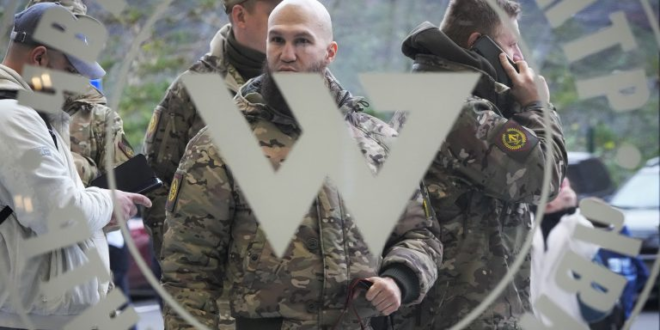11-months into the war in Ukraine, significant Russian military casualties have forced Moscow to rely more heavily on the Wagner Group, a Kremlin-linked private military company.
Amid battlefield attrition of his forces, Wagner head Prigozhin has lowered recruiting standards and is actively recruiting from Russian prisons.
Prison recruitments will inevitably lead to increased human rights abuses by Wagner.
The Wagner group’s growing role in Ukraine has led to infighting and finger-pointing between Prighozhin and senior members of the Russian armed forces, including high-profile generals like Valery Gerasimov.
As the conflict in Ukraine reaches the 11-month mark, Russian military forces continue to suffer significant casualties, forcing Moscow to rely more heavily on the Wagner Group, a Kremlin-linked private military company that serves to extend Russia’s official security capacity. Wagner’s founder, Yevgeny Prigozhin, has assumed a more overt and hands-on approach to the war in Ukraine over the past several months, following his longstanding aversion to admitting leadership and operations of the group. He has deployed Wagner forces to high-profile campaigns like the one surrounding Bakhmut in a bid to improve his public image. Though they are described as “zombies” and human cannon fodder dispatched to overwhelm Ukrainian defenses via quantity rather than quality, these forces have played a leading role in helping Russia take control of territory around Soledar, Klishchiivka, Bakhmut, and elsewhere in the Donbas. The value of salt and gypsum mines around Bakhmut may have enticed Prigozhin to commit forces to the area, whose strategic value has been questioned by some military analysts. Alternatively, Bakhmut’s importance may be more symbolic for Prigozhin, who has sought to boost his political capital in recent months and seems increasingly eager to engage in factional politics against established figures in the military and security forces. After a spate of embarrassing defeats for the Russian military, Prigozhin may have seen Bakhmut as an opportunity to prove Wagner’s superiority over conventional Russian forces.
As Wagner forces have suffered attrition on the battlefield, Prigozhin has lowered the group’s standards for new recruits, even actively recruiting from Russian prisons and adding murderers, rapists, and hardened criminals to Wagner’s ranks. Throughout Africa and the Middle East, and as evidenced by its actions in Ukraine, Wagner forces appear to operate with wanton disregard for human rights and have been credibly accused of war crimes and other grievous acts, often in support of governments that have offered mining or other concessions in return for security. In countries such as Mali, Sudan, Libya, Central African Republic, and elsewhere, Wagner operatives have allegedly committed acts of torture, rape, and summary executions. Gold, diamonds, and other precious resources and minerals are then laundered in an effort to evade Western sanctions. The transactional nature of Wagner’s operations ensure that its forces will withdraw once resources and minerals are depleted, leaving instability in their wake.
Prigozhin’s reach into Russian prisons bodes ill for human rights, with reported abuses regularly perpetrated by Wagner recruits. By lowering standards to such a nadir, Wagner is taking a page from the so-called Islamic State’s playbooks, prioritizing volume rather than quality in recruits, and deliberately unleashing brutality to sow fear. Recruits receive minimal training—in some cases as little as a few weeks—before being sent into combat on the front lines. These recruits’ expendability makes them useful in operations where Wagner leadership is unwilling to risk more seasoned personnel. While their sheer numbers may temporarily assuage Russia’s manpower shortages, poorly disciplined troops with inadequate training negatively impact any remaining esprit de corps. Recent reports suggest that Wagner’s recruiting has now extended to female prisoners as well as political prisoners from Chechnya and elsewhere in the Caucasus. Prisoners are offered to have their sentences commuted if they survive six-month deployments to Ukraine, although Prigozhin has made clear that anyone who attempted to desert would be shot on sight, and Wagner has established a unit to track and kill deserters. A video released in December showed Wagner personnel executing one such deserter using a sledgehammer. Despite these horrific consequences, a former senior Wagner fighter claiming to have witnessed the group’s crimes in Ukraine recently turned himself in to Norwegian authorities. If his account is verified, his testimony could eventually be used to bring criminal charges against Wagner leadership and contribute to international efforts to hold Russia accountable for the crime of aggression.
Wagner’s growing role in Ukraine offers further evidence that it is not an autonomous organization, but a Russian proxy doing the bidding of Russian President Vladimir Putin. Infighting between Wagner and senior leaders in the Russian military has also spilled out into the public. Prigozhin was apparently bothered that his forces were not receiving enough credit for their role in Bakhmut and pointed fingers at the overall dysfunction of the Russian military. In a stark example of poor morale, Wagner operatives have released videos on social media directly criticizing the leadership of Russia’s armed forces in extremely derogatory terms. These videos even took aim at Russia’s highest-ranking military officer, General Valery Gerasimov, who was recently tapped to replace General Sergei Surovikin to lead the war in Ukraine. Wagner’s prison recruitments will leave Russia with legions of criminals to deal with when the war eventually ends or winds down. Rather than reintegrating into society, these individuals, many of whom have witnessed or participated in crimes in Ukraine, could further destabilize Russia or seek employment with transnational criminal organizations or other illicit actors.
 Eurasia Press & News
Eurasia Press & News




